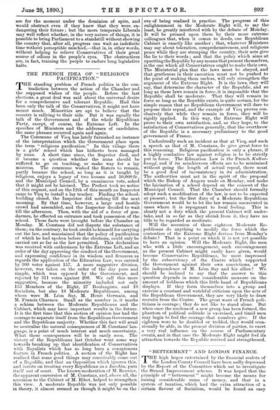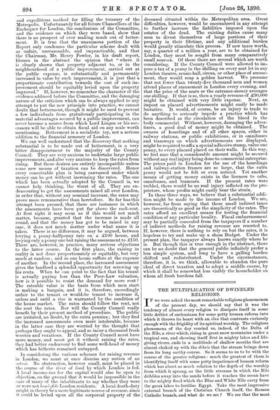"BETTERMENT" AND LONDON FINANCE.
THE high hopes entertained by the financial zealots of the London County Council have been sadly depressed.. by the Report of the Committee which sat to investigate• the Strand Improvement scheme. It was hoped that the principle of " betterment " might become the means for raising considerable sums of money, and that in a. system of taxation, which had the extra attraction of a, certain flavour of Socialism, would be found an easy and expeditious method for filling the treasury of the Metropolis. Unfortunately for all future Chancellors of the Exchequer for London, the conclusions of the Committee, and the evidence on which they were based, show that -there is no prospect of ever making much out of better- ment. It is true that the unanimous portion of the Report only condemns the particular scheme dealt with as unfair, unreasonable, and impracticable, and that the Chairman, Mr. Henry Fowler, in his draft report, blesses in the abstract the opinion that " where it is clearly shown that property adjacent to, or in the neighbourhood of a public improvement, carried out at the public expense, is substantially and permanently increased in value by such improvement, it is just that a proportionate contribution towards the cost of such im- provement should be equitably levied upon the property improved." If, however, we remember the character of the evidence adduced before the Committee, and the damaging nature of the criticism which can be always applied to any attempt to put the new principle into practice, we cannot doubt that betterment, though it might be used to prevent a few individuals from gratuitously participating in the material advantages secured by a public improvement, can never become a source from which Lord Lingen or his suc- cessors will be able to obtain fiscal aid on any scale worth mentioning. Betterment is a socialistic toy, not a serious addition to the financial armoury of London.
We can well understand that the discovery that nothing substantial is to be made out of betterment, is a very bitter disappointment to the majority of the County Council. They are very anxious to undertake large public improvements, and also very anxious to keep the rates from rising. But these desires are entirely incompatible unless some new means of taxation can be discovered. Hence every conceivable plan is being canvassed under which money can be got without increasing the rates. The one which has been actually adopted by the Council is, we cannot help thinking, the worst of all. They are en- deavouring to get the assessments raised all over London, in order that, without any nominal increase, the rates may prove more remunerative than heretofore. So far has this attempt been pressed, that there are instances in which the assessments have been put far above the rack-rent. At first sight it may seem as if this would not much matter, because, granted that the increase is made all round, and that the money has got to be raised in any case, it does not much matter under what name it is taken. There is no difference, it may be argued, between levying a penny-halfpenny rate on a £100 house, and levying only a penny one but raising the assessment to £150. There are, however, in practice, many serious objections to the latter course. In the first place, the raising in reality is not done proportionately or equitably, but very much at random ; and so one house suffers at the expense of another. In the second place, the increased assessment gives the landlord a splendid opportunity for screwing up his rents. When he can point to the fact that his tenant is actually paying less than the Poor-Law valuation, how is it possible to resist the demand for more rent ? The rateable value is the basis from which men start in making a bargain, and it is, therefore, exceedingly unfair to the tenant or would-be tenant to increase it, unless and until a rise is warranted by the condition of the house market. The rates should follow the rent, not the rent the rates. Nor will the County Council really benefit by their present method of procedure. The public are irritated, no doubt, by the extra pennies ; but they find the increased assessments even more intolerable, because in the latter case they are worried by the thought that perhaps they ought to appeal, and so incur a thousand fresh worries and vexations. If the County Council must have more money, and must get it without raising the rates, they had better endeavour to find some well-head of money which has hitherto remained untapped.
In considering the various schemes for raising revenue in London, we must at once dismiss any notion of an petrol. No obstruction, however small, must be placed in the course of the river of food by which London is fed. A local income-tax for the capital would also be open to objection, on the ground that it would be impossible in the case of many of the inhabitants to say whether they were or were not bond fideLondon residents. A local death-duty might in theory be a more legitimate source of revenue, since it could be levied upon all the corporeal property of the deceased situated within the Metropolitan area. Great difficulties, however, would be encountered in any attempt to further increase the liabilities imposed upon the estates of the dead. The existing duties cause many men to divest themselves of large portions of their property in their lifetime, and any additional burden would greatly stimulate this process. If new taxes worth, say, a quarter of a million a year, are to be obtained for London, they must be sought from many comparatively small sources. Of these there are several which are worth considering. If the County Council were allowed to im- pose a tax of a penny in the shilling on every seat let in any London theatre, music-hall, circus, or other place of amuse- ment, they would reap a golden harvest. We presume that not fewer than twenty-five thousand men and women attend places of amusement in London every evening, and that the price of the seats or the entrance-money averages one shilling. If that is so, then a yearly revenue of £30,000 might be obtained with very little expense. Next, an impost on placard advertisements might easily be made lucrative. It would, of course, be an injury to trade to do anything to seriously impede a practice which has been described as the circulation of the blood in the body commercial. Without, however, damaging the adver- tisers, a good deal of money might be obtained.. The owners of hoardings and of all other spaces, either in railway stations, or public exhibitions, or in omnibuses and tramways on which advertisements are displayed, might be required to affix a special adhesive stamp, value one penny, to every placard placed on their walls. In this way; we feel sure that a considerable amount might be secured without any real injury being done to commercial enterprise. The prices paid in London for the use of the hoardings and railway-station frames are so large, that the extra penny would not be felt or even noticed. Yet another means of getting money exists in the licences to cabs, omnibuses, and tramcars. If the present rates were trebled, there would be no real injury inflicted on the pro- prietors, whose profits might easily bear the strain. In these three ways, we believe that a substantial addi- tion might be made to the income of London. We are, however, far frem saying that these small indirect taxes are theoretically as good as the simplicity of the rates. The rates afford an excellent means for testing the financial condition of any particular locality. Fiscal embarrassment may be partially concealed from the taxpayers if a number of indirect methods for raising revenue are resorted to. If, however, there is nothing to rely on but the rates, it is hopeless to try and make up a sham Budget. Under the present plan, the taxpayer always knows exactly where he is. But though this is true enough in the abstract, there can be no doubt that the general public infinitely prefer a less simple system, and long to have a galling burden shifted and redistributed. Under the circumstances, therefore, it is, we think, allowable to abandon the pure ideal of direct taxation and to adopt a middle course, by which it shall be somewhat less visibly the householder on whom all fresh burdens fall.



















































 Previous page
Previous page